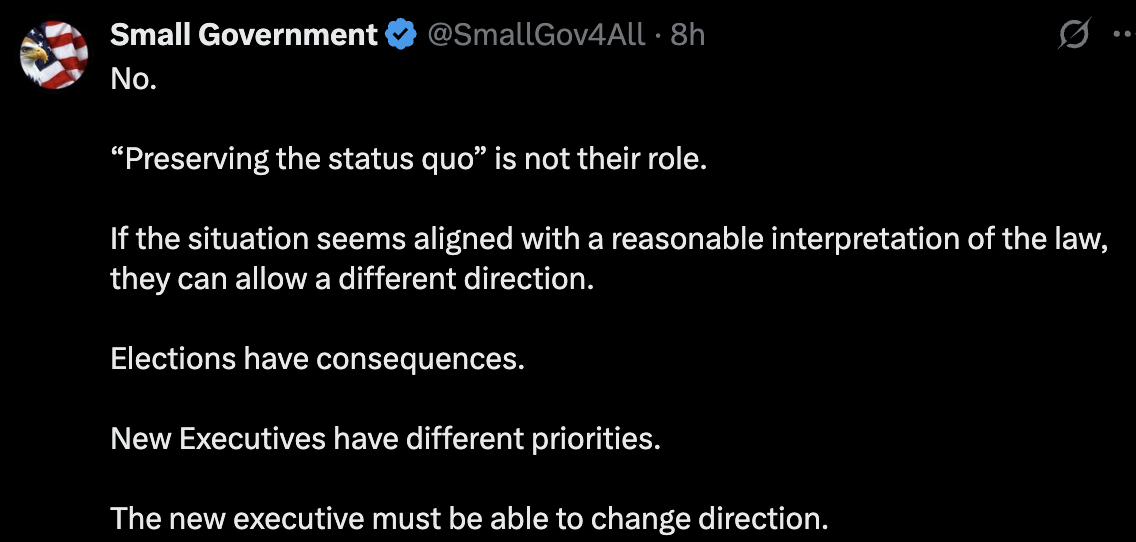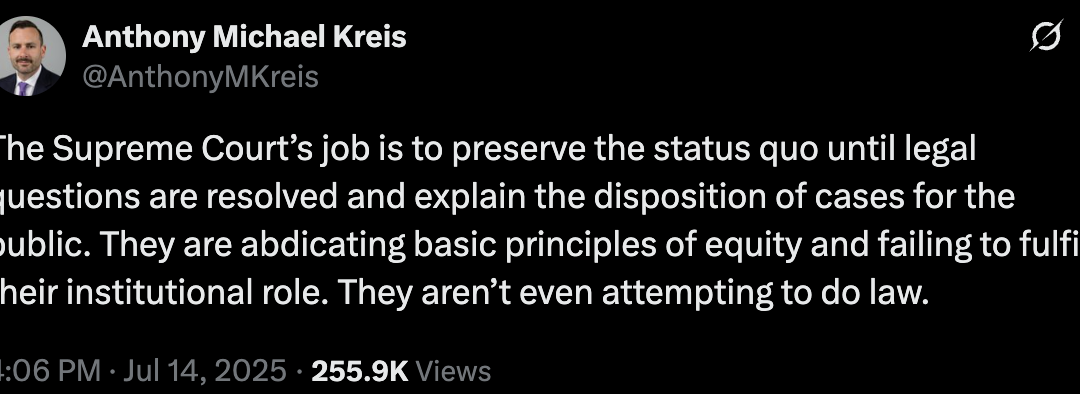Last night, the Supreme Court authorized the Trump administration to dismantle the Education Department, using the shadow docket to block efforts to temporarily halt the action. When the dust settles, the administration should lose, but by then all that will be left of the Department of Education will be three raccoons in a trenchcoat calling in student loans. That’s assuming the raccoons survive the layoffs and aren’t reassigned to monitor library books for gay thoughts. The decision makes no sense in any world where Congress has a seat at the checks and balances table and even less when you remember this same Court ruled the exact opposite way when Biden tried to forgive a few student loans. It’s a betrayal of basic principles of equity.
Lawyers understand that “equity” in this sentence means the body of law that governs stuff like stays and injunctions. There are a lot of people who are not lawyers — most of them self-identifying as “textualists” naturally — who do not understand this and they are very eager to share their sense of how the law works with people orders of magnitude smarter than them.
Professor Kries — a law professor at Georgia State University College of Law and the official “AMK” since he’s not the one responsible for Justice Keggy McFratboy — continued, “There’s no way the equities, when balanced, favor the Administration.” Which seems accurate since even if these justices are inclined to upend the separation of powers on the merits, that’s only one factor and avoiding the irreparable harm of firing thousands of people while the case leisurely winds its way through the court system would more than outweigh.
In any event, the replies had thoughts in much the same way squirrels in traffic have a transportation policy:

This particular account, which took a break from defending the non-release of the Epstein files for this, might want to check out Article III: “The judicial Power shall extend to all Cases, in Law and Equity….” But even at that, I also suspect that he didn’t actually “just read” any of the Constitution here. The Constitution is like a gym membership for these people: they talk about it constantly, it’s mostly aspirational, and they’re winded after the Preamble.


Again… you just need to open the Constitution and hit Cntrl-F. It’s right there. Boundless clean energy to be had if we could just harness the unearned confidence of someone without a law degree to talk about law without even consulting the very short document they’re talking about!
What is it with this theory that the Preamble should hold controlling sway over everything that comes after it? I mean, I know what’s up with it: vague, aspirational language is more amenable to disingenuous textualist nonsense so someone can act like “Domestic Tranquility” in the opening paragraph means the Fourteenth Amendment doesn’t have to exist several pages later.
But it is weird that “well-regulated militia” is the only prefatory language that doesn’t earn any force given that it’s actually in the same sentence.

This account describes itself as a “Constitutional and fiscal conservative….”
The Federalist Society is doubtless already in touch about the federal bench.

A YouTuber that claims to be an attorney but somehow missed civil procedure. But at least he’s on top of his Cntrl-F game, so doing better!


Here we’re leveling up from “I don’t see that in the Constitution” to elevate Marbury v. Madison as though it actually is in the Constitution.

An account called “Small Government” arguing for unbridled, monarchical power… HOOK IT TO MY VEINS! Just fabulous.
But also this misses the point because even IF the Supreme Court wants to reward kingly powers to the executive it has to wait its turn. The case has to work its way to them and until that juncture, the Supreme Court — like all other courts — are bound by principles of equity to maintain the status quo until such time that the matter is fully briefed and argued and through all the congressionally established tiers of inferior courts.
Just hundreds and hundreds of very dumb people arguing passionately for what they imagine the Constitution to say.

Joe Patrice is a senior editor at Above the Law and co-host of Thinking Like A Lawyer. Feel free to email any tips, questions, or comments. Follow him on Twitter or Bluesky if you’re interested in law, politics, and a healthy dose of college sports news. Joe also serves as a Managing Director at RPN Executive Search.
The post Professor Discusses Equitable Relief, Bombarded With Replies Complaining About DEI appeared first on Above the Law.

